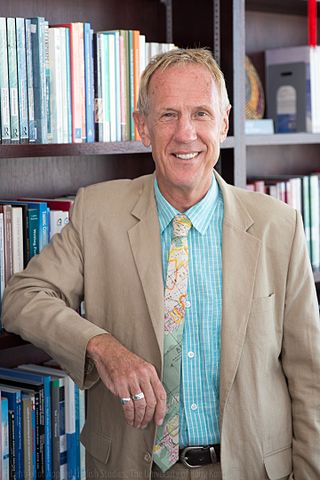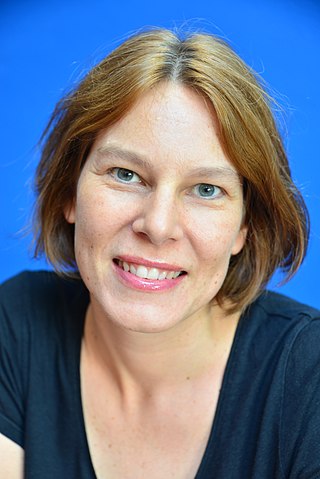Related Research Articles
Corpus linguistics is the study of a language as that language is expressed in its text corpus, its body of "real world" text. Corpus linguistics proposes that a reliable analysis of a language is more feasible with corpora collected in the field—the natural context ("realia") of that language—with minimal experimental interference. The large collections of text allow linguistics to run quantitative analyses on linguistic concepts, otherwise harder to quantify.
Polari is a form of slang or cant used in Britain by some actors, circus and fairground showmen, professional wrestlers, merchant navy sailors, criminals, sex workers, and, particularly, the gay subculture. There is some debate about its origins, but it can be traced to at least the 19th century and possibly as early as the 16th century. There is a long-standing connection with Punch and Judy street puppet performers, who traditionally used Polari to converse.
Geoffrey Neil Leech FBA was a specialist in English language and linguistics. He was the author, co-author, or editor of more than 30 books and more than 120 published papers. His main academic interests were English grammar, corpus linguistics, stylistics, pragmatics, and semantics.

Corpora is a three times yearly peer-reviewed linguistic academic journal that publishes scholarly articles and book reviews on corpus linguistics, with a focus on corpus construction and corpus technology. It is edited by Tony McEnery.

Internet linguistics is a domain of linguistics advocated by the English linguist David Crystal. It studies new language styles and forms that have arisen under the influence of the Internet and of other new media, such as Short Message Service (SMS) text messaging. Since the beginning of human–computer interaction (HCI) leading to computer-mediated communication (CMC) and Internet-mediated communication (IMC), experts, such as Gretchen McCulloch have acknowledged that linguistics has a contributing role in it, in terms of web interface and usability. Studying the emerging language on the Internet can help improve conceptual organization, translation and web usability. Such study aims to benefit both linguists and web users combined.
Corpus-assisted discourse studies is related historically and methodologically to the discipline of corpus linguistics. The principal endeavor of corpus-assisted discourse studies is the investigation, and comparison of features of particular discourse types, integrating into the analysis the techniques and tools developed within corpus linguistics. These include the compilation of specialised corpora and analyses of word and word-cluster frequency lists, comparative keyword lists and, above all, concordances.
William Leap is an emeritus professor of anthropology at American University and an affiliate professor in the Women's, Gender and Sexuality Studies Program at Florida Atlantic University. He works in the overlapping fields of language and sexuality studies and queer linguistics, and queer historical linguistics.

Michael Hoey was a British linguist and Baines Professor of English Language. He lectured in applied linguistics in over 40 countries.

Mark E. Davies is an American linguist. He specializes in corpus linguistics and language variation and change. He is the creator of most of the text corpora from English-Corpora.org as well as the Corpus del español and the Corpus do português. He has also created large datasets of word frequency, collocates, and n-grams data, which have been used by many large companies in the fields of technology and also language learning.
The Spoken English Corpus (SEC) is a speech corpus collection of recordings of spoken British English compiled during 1984–1987. The corpus manual can be found on ICAME.
Susan Elizabeth Hunston is a British linguist. She received her PhD in English under the supervision of Michael Hoey at the University of Birmingham in 1989. She does research in the areas of corpus linguistics and applied linguistics. She is one of the primary developers of the Pattern Grammar model of linguistic analysis, which is a way of describing the syntactic environments of individual words, based on studying their occurrences in large sets of authentic examples, i.e. language corpora. The Pattern Grammar model was developed as part of the COBUILD project, where Hunston worked for several years as a senior grammarian for the Collins Cobuild English Dictionary.
The International Computer Archive of Modern and Medieval English (ICAME) is an international group of linguists and data scientists working in corpus linguistics to digitise English texts. The organisation was founded in Oslo, Norway in 1977 as the International Computer Archive of Modern English, before being renamed to its current title.
Elena Semino is an Italian-born British linguist whose research involves stylistics and metaphor theory. Focusing on figurative language in a range of poetic and prose works, most recently she has worked on topics from the domains of medical humanities and health communication. Her projects use corpus linguistic methods as well as qualitative analysis.
Svenja Adolphs is a British linguist whose research involves analysis of corpus data including sources of multimodal material such as the Nottingham Multimodal Corpus (NMMC) to examine communication in new forms of digital records. Using visual mark-up systems, her work allows a better understanding of the nature of natural language use. She is a co-founder of the Health Language Research Group at the University of Nottingham, bringing together academics and clinicians to advance the work of applied linguistics in health care settings.

Ken Hyland is a British linguist. He is currently a professor of applied linguistics in education at the University of East Anglia.
Jane Sunderland is a British linguist and playwright. She is currently an Honorary Reader in Gender and Discourse at the Department of Linguistics and English Language of Lancaster University, United Kingdom. Her research focuses on language and gender, Identity and language learning and critical discourse analysis.
Michael Henry 'Mick' Short is a British linguist. He is currently an honorary professor at the Department of Linguistics and English Language of Lancaster University, United Kingdom. His research focuses on applied linguistics with a special focus on stylistics.
Rosalind Ivanić is a Yugoslav-born British linguist. She is currently an honorary professor at the Department of Linguistics and English Language of Lancaster University, United Kingdom. Her research focuses on applied linguistics with a special focus on literacy, intertextuality, multimodal communication, adult literacy, educational linguistics, critical language awareness, punctuation, and second language writing. Along with Theo van Leeuwen and David Barton, she is considered one of the most prominent researchers on literacy.
Greg Myers is an American linguist. He is currently an Emeritus professor at the Department of Linguistics and English Language of Lancaster University, United Kingdom. His research focuses on applied linguistics with a special focus on critical discourse analysis.

Monika Bednarek is a German-born Australian linguist. She is a professor in linguistics at the University of Sydney and director of the Sydney Corpus Lab. She is one of the co-developers of Discursive News Values Analysis (DNVA), which is a framework for analyzing how events are constructed as newsworthy through language and images. Her work ranges across various linguistic sub-disciplines, including corpus linguistics, media linguistics, sociolinguistics, discourse analysis, stylistics, and applied linguistics.
References
- ↑ "Baker - Lancaster University". lancaster.ac.uk. 20 March 2019.
- ↑ "Paul Baker on the website of The Guardian". The Guardian. 20 March 2019.
- ↑ "The Lost Gay Language of Britain's '60s". Npr.org. 8 November 2003.
- ↑ "Polari, a vibrant language born out of prejudice". Guardian. 10 May 2010.
- ↑ "The secret language that broke taboos". BBC. 27 July 2017.
- ↑ "Honour for Lancaster University linguist". lancaster.ac.uk. 6 November 2017.
- ↑ "Award winning work on the language of Polari". lancaster.ac.uk. 5 September 2018.
- ↑ "Polari exhibition at the John Rylands Library, Manchester uses Paul Baker's research". Lancaster University. 19 September 2012.
- ↑ "The decline of the gradable adverb". The Telegraph. 11 November 2017.
- ↑ "What do patients really think of NHS staff?" . Independent. 13 May 2019. Archived from the original on 25 May 2022.
- ↑ "Paul Baker - Google Scholar". Google Scholar. 3 April 2019.